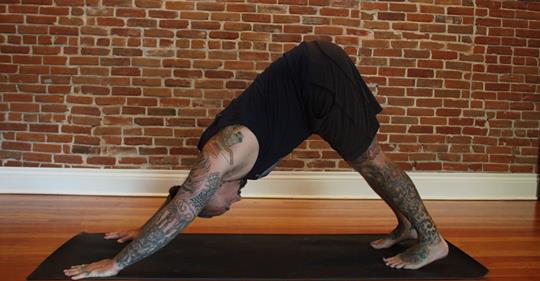Why Athletes Need Yoga

In my career as a basketballer and time as a cage fighter I amassed around 40,000 hours of high-level, high-impact physicality…in that time I also suffered a number of injuries and underwent exactly five surgeries.
If you had to live in my body…who-wee. My knees creek when I struggle out of bed to pee every morning.
(I’m 37 years old, incidentally.)
Somewhere around the age of 30, the miles were wearing on me and I made a conscious choice to invite balance into my life through a more conscientious engagement of physicality…
I had to ask myself, “How do you balance raw power with self-restraint?”
When all of the sudden I couldn’t dunk anymore, how was I to tally the score? I know that hollow feeling of no longer being able to measure my self-esteem simply through winning.
I was forced to temper my enthusiasm with wisdom, to balance my inherent drive for physical discipline with acceptance and grace.
“Just do it” was suddenly replaced with the less in your face “just accept it.”
Whether one competes in a cage or in the field, there are inherent risks associated with the clash of titans both physically and mentally.
148,000 concussions were meted out in high-school football last year alone.
Such statistics suggest a paradigm shift is necessary — one which balances wellness and self-worth so that whole body health from the inside out is a more relevant measurement than performance or appearance.
It was for this very reason that I turned to yoga.
Coming from the cage, the practice instantly resonated with me. Yoga is, after all, a martial art. But unlike other forms, its ways are fierce and smart. It provides a platform and a methodology with which to excavate into the psyche, unearthing our best selves.
The yoga practice provided me a way to look beyond the surface of the body, to get to what exactly was lying at the heart of me.
If I had a legacy to offer for a high school basketball player, or a mid-career warrior, I would wish for them a sustained measure of this kind of peaceful presence.
It is for precisely this reason that my current wellness regimen is designed around balance, not just performance. I balance the time spent on my mat by spending equal spans in the weight and recovery rooms.
I wish for the athletes of today and tomorrow to be better than me, smarter than me and more long-range thinkers than me. Instead of cutting the tissue so you can play next week, take time to heal intelligently so you can compete your entire life. Spend an hour or two on a yoga mat or in meditation — a little stillness will enhance your performance in ways that you can’t even imagine.

